
Geranium is a genus of 422 species of annual, biennial, and perennial plants that are commonly known as geraniums or cranesbills. They are found throughout the temperate regions of the world and the mountains of the tropics, with the greatest diversity in the eastern part of the Mediterranean region.
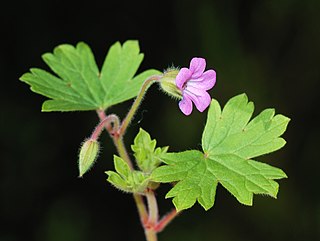
Geraniaceae is a family of flowering plants placed in the order Geraniales. The family name is derived from the genus Geranium. The family includes both the genus Geranium and the garden plants called geraniums, which modern botany classifies as genus Pelargonium, along with other related genera.

Pelargonium is a genus of flowering plants that includes about 280 species of perennials, succulents, and shrubs, commonly called geraniums, pelargoniums, or storksbills. Geranium is also the botanical name and common name of a separate genus of related plants, also known as cranesbills. Both genera belong to the family Geraniaceae. Carl Linnaeus originally included all the species in one genus, Geranium, and they were later separated into two genera by Charles Louis L'Héritier de Brutelle in 1789.

Geranium robertianum, commonly known as herb-Robert, or Roberts geranium, is a common species of cranesbill native to Europe and parts of Asia, North Africa, and parts of North America. The plant has many vernacular names, including red robin, death come quickly, fox geranium, stinking Bob, squinter-pip (Shropshire) and crow's foot.
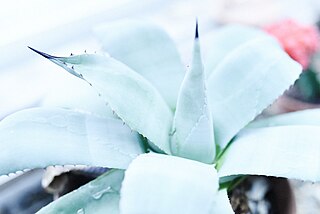
The New Canaan Nature Center is a botanical garden, arboretum and nature preserve located at 144 Oenoke Ridge, Route 124, about .25 miles (0.40 km) north of the center of New Canaan, Connecticut.

Dysphania botrys, the Jerusalem oak goosefoot, sticky goosefoot or feathered geranium, is a flowering plant in the genus Dysphania. It is native to the Mediterranean region.

Geranium sanguineum, common names bloody crane's-bill or bloody geranium, is a species of hardy flowering herbaceous perennial plant in the cranesbill family Geraniaceae. It is the county flower of Northumberland.
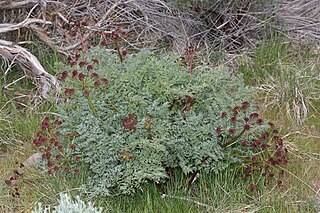
Lomatium dissectum is a species of flowering plant in the carrot family known by the common names fernleaf biscuitroot and fernleaf desert parsley. It is native to much of western North America, where it grows in varied habitat. It is found in the eastern slopes of the Cascade Range, Rocky Mountains, Klamath Mountains, eastern Transverse Ranges and the Sierra Nevada in California.
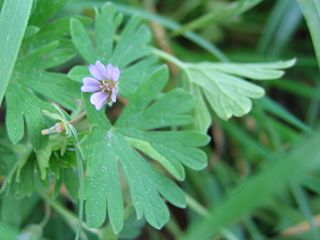
Geranium pusillum, commonly known as small-flowered crane's-bill or small geranium, is a herbaceous annual plant of the genus Geranium.

Geranium pratense, the meadow crane's-bill or meadow geranium, is a species of flowering plant in the family Geraniaceae, native to Europe and Asia. Forming a clump up to 1 m (3.3 ft) broad, it is a herbaceous perennial with hairy stems and lax saucer-shaped blooms of pale violet. It is extremely hardy to at least −20 °C (−4 °F), reflecting its origins in the Altai Mountains of central Asia.

Erodium malacoides is a species of flowering plant in the geranium family known by the common names Mediterranean stork's bill, soft stork's-bill and oval heron's bill. This is an annual or biennial herb which is native to much of Eurasia and North Africa but can be found on most continents where it is an introduced species.
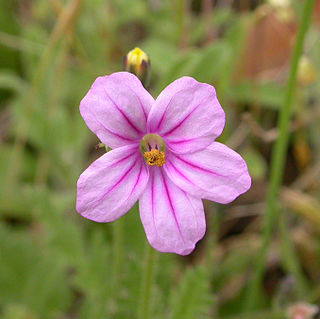
Erodium botrys is a species of flowering plant in the geranium family known by the common names longbeak stork's bill, Mediterranean stork's-bill and broadleaf filaree.
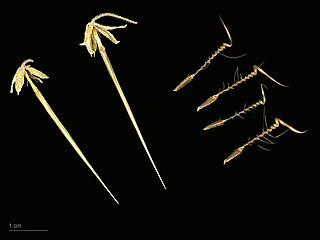
Erodium moschatum is a species of flowering plant in the geranium family known by the common names musk stork's-bill and whitestem filaree. This is a weedy annual or biennial herb which is native to much of Eurasia and North Africa but can be found on most continents where it is an introduced species. The young plant starts with a flat rosette of compound leaves, each leaf up to 15 centimeters long with many oval-shaped highly lobed and toothed leaflets along a central vein which is hairy, white, and stemlike. The plant grows to a maximum of about half a meter in height with plentiful fuzzy green foliage. The small flowers have five sepals behind five purple or lavender petals, each petal just over a centimeter long. The filaree fruit has a small, glandular body with a long green style up to 4 centimeters in length.

Geranium macrorrhizum is a species of hardy flowering herbaceous perennial plant in the genus Geranium, family Geraniaceae. It is native to the South east Alps and the Balkans. Its common names include bigroot geranium, Bulgarian geranium, and rock crane's-bill.
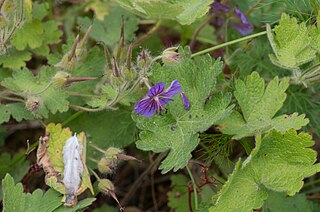
Geranium ibericum, commonly called Caucasian crane's-bill or Iberian geranium or Caucasus geranium, is a herbaceous plant species in the family Geraniaceae. It is native to Western Asia, including Turkey and the Caucasus, and is cultivated as a garden subject. It has a dense mounding habit, and violet colored flowers.

Cirsium dissectum, also known as meadow thistle, is an erect perennial herb. It is found in Great Britain, Ireland, France, the Netherlands, Germany, Italy, Spain, Hungary, Norway, etc. It is found in fens and less acidic peat bogs i.e. it prefers damp boggy areas.

Sceptridium dissectum is a common fern in the family Ophioglossaceae, occurring in eastern North America. Like other plants in this group, it normally only sends up one frond per year. It has long been the subject of confusion because the frond presents in one of two forms, either the normal form that resembles other plants in the genus, or the skeletonized form.

Acer palmatum, commonly known as Japanese maple, palmate maple, or smooth Japanese maple (Korean: danpungnamu, 단풍나무, Japanese: irohamomiji, イロハモミジ, or momiji,, is a species of woody plant native to Korea, Japan, China, eastern Mongolia, and southeast Russia. Many different cultivars of this maple have been selected and they are grown worldwide for their large variety of attractive forms, leaf shapes, and spectacular colors.

Pelargonium × hortorum, commonly called zonal geranium, or garden geranium, is a nothospecies of Pelargonium most commonly used as an ornamental plant. It is a hybrid between Pelargonium zonale and Pelargonium inquinans. They are the group of Pelargonium cultivars, with leaves marked with a brown annular zone and inflorescence in the form of large balls of tight flowers, usually red, pink, or white. These are the most common geraniums of garden centers and florists, sold in pots for windowsills and balconies or planted in flowerbeds.

Geranium purpureum, the little-robin, is a species of plant in the genus Geranium.






















